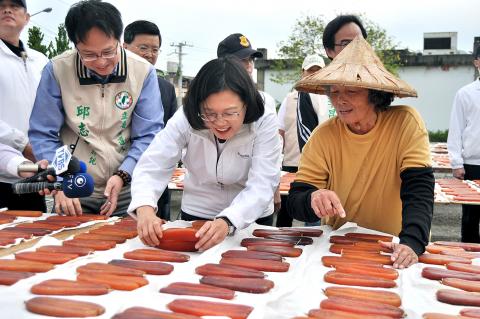Democratic Progressive Party (DPP) Chairperson Tsai Ing-wen (蔡英文) has taken a small lead over President Ma Ying-jeou (馬英九) in the presidential election campaign, a poll released by Taiwan Thinktank yesterday showed.
According to the poll, Tsai had 35.9 percent support against Ma’s 35.4 percent, while support for People First Party Chairman James Soong (宋楚瑜) was at 10.8 percent, the poll showed.
Compared with a previous poll conducted by the group earlier this month, support for both Ma and Tsai dropped about 3 percent.

Photo: Su Fu-nan, Taipei Times
Former DPP legislator Julian Kuo (郭正亮) said the result showed that recent incidents and disputes, from the price of persimmons to the first presidential debate last Saturday to controversy surrounding DPP vice presidential candidate Su Jia-chuan’s (蘇嘉全) wife, Hung Heng-chu (洪恆珠), for attending at a party 10 years ago that featured a male strip show, did not benefit any candidate.
Instead, the incidents added uncertainty to the election, Kuo said, as the percentage of undecided voters increased from 10 to 17.9 percent.
On growing youth unemployment, 76.9 percent of respondents said that it was a serious issue that needed to be addressed promptly, while 65.8 percent said forced unpaid leave among private businesses was also a serious matter.
“The poll showed that the unemployment rate among young people and unpaid leave are serious issues for voters regardless of party preferences, and presidential candidates should focus more on addressing the issues,” Hsu Yung-ming (徐永明), a political scientist at Soochow University, said at a press conference held to release the poll results.
Liu Chin-hsin (劉進興), a retired professor at National Taiwan University of Science and Technology, said income and employment are two key economic elements, and the presidential candidates should address those issues because they concern the public the most.

CHANGING LANDSCAPE: Many of the part-time programs for educators were no longer needed, as many teachers obtain a graduate degree before joining the workforce, experts said Taiwanese universities this year canceled 86 programs, Ministry of Education data showed, with educators attributing the closures to the nation’s low birthrate as well as shifting trends. Fifty-three of the shuttered programs were part-time postgraduate degree programs, about 62 percent of the total, the most in the past five years, the data showed. National Taiwan Normal University (NTNU) discontinued the most part-time master’s programs, at 16: chemistry, life science, earth science, physics, fine arts, music, special education, health promotion and health education, educational psychology and counseling, education, design, Chinese as a second language, library and information sciences, mechatronics engineering, history, physical education

The Chinese military has boosted its capability to fight at a high tempo using the element of surprise and new technology, the Ministry of National Defense said in the Quadrennial Defense Review (QDR) published on Monday last week. The ministry highlighted Chinese People’s Liberation Army (PLA) developments showing significant changes in Beijing’s strategy for war on Taiwan. The PLA has made significant headway in building capabilities for all-weather, multi-domain intelligence, surveillance, operational control and a joint air-sea blockade against Taiwan’s lines of communication, it said. The PLA has also improved its capabilities in direct amphibious assault operations aimed at seizing strategically important beaches,

New Taipei City prosecutors have indicted a cram school teacher in Sinjhuang District (新莊) for allegedly soliciting sexual acts from female students under the age of 18 three times in exchange for cash payments. The man, surnamed Su (蘇), committed two offenses in 2023 and one last year, the New Taipei District Prosecutors’ Office said. The office in recent days indicted Su for contraventions of the Child and Youth Sexual Exploitation Prevention Act (兒童及少年性剝削防制條例), which prohibits "engaging in sexual intercourse or lewd acts with a minor over the age of 16, but under the age of 18 in exchange for

The High Prosecutors’ Office yesterday withdrew an appeal against the acquittal of a former bank manager 22 years after his death, marking Taiwan’s first instance of prosecutors rendering posthumous justice to a wrongfully convicted defendant. Chu Ching-en (諸慶恩) — formerly a manager at the Taipei branch of BNP Paribas — was in 1999 accused by Weng Mao-chung (翁茂鍾), then-president of Chia Her Industrial Co, of forging a request for a fixed deposit of US$10 million by I-Hwa Industrial Co, a subsidiary of Chia Her, which was used as collateral. Chu was ruled not guilty in the first trial, but was found guilty